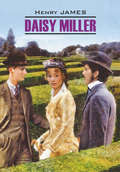
Генри Джеймс
An International Episode
PART II
In point of fact, as Percy Beaumont would have said, Mrs. Westgate disembarked on the 18th of May on the British coast. She was accompanied by her sister, but she was not attended by any other member of her family. To the deprivation of her husband’s society Mrs. Westgate was, however, habituated; she had made half a dozen journeys to Europe without him, and she now accounted for his absence, to interrogative friends on this side of the Atlantic, by allusion to the regrettable but conspicuous fact that in America there was no leisure class. The two ladies came up to London and alighted at Jones’s Hotel, where Mrs. Westgate, who had made on former occasions the most agreeable impression at this establishment, received an obsequious greeting. Bessie Alden had felt much excited about coming to England; she had expected the “associations” would be very charming, that it would be an infinite pleasure to rest her eyes upon the things she had read about in the poets and historians. She was very fond of the poets and historians, of the picturesque, of the past, of retrospect, of mementos and reverberations of greatness; so that on coming into the English world, where strangeness and familiarity would go hand in hand, she was prepared for a multitude of fresh emotions. They began very promptly—these tender, fluttering sensations; they began with the sight of the beautiful English landscape, whose dark richness was quickened and brightened by the season; with the carpeted fields and flowering hedgerows, as she looked at them from the window of the train; with the spires of the rural churches peeping above the rook-haunted treetops; with the oak-studded parks, the ancient homes, the cloudy light, the speech, the manners, the thousand differences. Mrs. Westgate’s impressions had, of course, much less novelty and keenness, and she gave but a wandering attention to her sister’s ejaculations and rhapsodies.
“You know my enjoyment of England is not so intellectual as Bessie’s,” she said to several of her friends in the course of her visit to this country. “And yet if it is not intellectual, I can’t say it is physical. I don’t think I can quite say what it is, my enjoyment of England.” When once it was settled that the two ladies should come abroad and should spend a few weeks in England on their way to the Continent, they of course exchanged a good many allusions to their London acquaintance.
“It will certainly be much nicer having friends there,” Bessie Alden had said one day as she sat on the sunny deck of the steamer at her sister’s feet on a large blue rug.
“Whom do you mean by friends?” Mrs. Westgate asked.
“All those English gentlemen whom you have known and entertained. Captain Littledale, for instance. And Lord Lambeth and Mr. Beaumont,” added Bessie Alden.
“Do you expect them to give us a very grand reception?”
Bessie reflected a moment; she was addicted, as we know, to reflection. “Well, yes.”
“My poor, sweet child,” murmured her sister.
“What have I said that is so silly?” asked Bessie.
“You are a little too simple; just a little. It is very becoming, but it pleases people at your expense.”
“I am certainly too simple to understand you,” said Bessie.
“Shall I tell you a story?” asked her sister.
“If you would be so good. That is what they do to amuse simple people.”
Mrs. Westgate consulted her memory, while her companion sat gazing at the shining sea. “Did you ever hear of the Duke of Green-Erin?”
“I think not,” said Bessie.
“Well, it’s no matter,” her sister went on.
“It’s a proof of my simplicity.”
“My story is meant to illustrate that of some other people,” said Mrs. Westgate. “The Duke of Green-Erin is what they call in England a great swell, and some five years ago he came to America. He spent most of his time in New York, and in New York he spent his days and his nights at the Butterworths’. You have heard, at least, of the Butterworths. Bien. They did everything in the world for him—they turned themselves inside out. They gave him a dozen dinner parties and balls and were the means of his being invited to fifty more. At first he used to come into Mrs. Butterworth’s box at the opera in a tweed traveling suit; but someone stopped that. At any rate, he had a beautiful time, and they parted the best friends in the world. Two years elapse, and the Butterworths come abroad and go to London. The first thing they see in all the papers—in England those things are in the most prominent place—is that the Duke of Green-Erin has arrived in town for the Season. They wait a little, and then Mr. Butterworth—as polite as ever—goes and leaves a card. They wait a little more; the visit is not returned; they wait three weeks—silence de mort—the Duke gives no sign. The Butterworths see a lot of other people, put down the Duke of Green-Erin as a rude, ungrateful man, and forget all about him. One fine day they go to Ascot Races, and there they meet him face to face. He stares a moment and then comes up to Mr. Butterworth, taking something from his pocketbook—something which proves to be a banknote. ‘I’m glad to see you, Mr. Butterworth,’ he says, ‘so that I can pay you that ten pounds I lost to you in New York. I saw the other day you remembered our bet; here are the ten pounds, Mr. Butterworth. Goodbye, Mr. Butterworth.’ And off he goes, and that’s the last they see of the Duke of Green-Erin.”
“Is that your story?” asked Bessie Alden.
“Don’t you think it’s interesting?” her sister replied.
“I don’t believe it,” said the young girl.
“Ah,” cried Mrs. Westgate, “you are not so simple after all! Believe it or not, as you please; there is no smoke without fire.”
“Is that the way,” asked Bessie after a moment, “that you expect your friends to treat you?”
“I defy them to treat me very ill, because I shall not give them the opportunity. With the best will in the world, in that case they can’t be very offensive.”
Bessie Alden was silent a moment. “I don’t see what makes you talk that way,” she said. “The English are a great people.”
“Exactly; and that is just the way they have grown great—by dropping you when you have ceased to be useful. People say they are not clever; but I think they are very clever.”
“You know you have liked them—all the Englishmen you have seen,” said Bessie.
“They have liked me,” her sister rejoined; “it would be more correct to say that. And, of course, one likes that.”
Bessie Alden resumed for some moments her studies in sea green. “Well,” she said, “whether they like me or not, I mean to like them. And happily,” she added, “Lord Lambeth does not owe me ten pounds.”
During the first few days after their arrival at Jones’s Hotel our charming Americans were much occupied with what they would have called looking about them. They found occasion to make a large number of purchases, and their opportunities for conversation were such only as were offered by the deferential London shopmen. Bessie Alden, even in driving from the station, took an immense fancy to the British metropolis, and at the risk of exhibiting her as a young woman of vulgar tastes it must be recorded that for a considerable period she desired no higher pleasure than to drive about the crowded streets in a hansom cab. To her attentive eyes they were full of a strange picturesque life, and it is at least beneath the dignity of our historic muse to enumerate the trivial objects and incidents which this simple young lady from Boston found so entertaining. It may be freely mentioned, however, that whenever, after a round of visits in Bond Street and Regent Street, she was about to return with her sister to Jones’s Hotel, she made an earnest request that they should be driven home by way of Westminster Abbey. She had begun by asking whether it would not be possible to take the Tower on the way to their lodgings; but it happened that at a more primitive stage of her culture Mrs. Westgate had paid a visit to this venerable monument, which she spoke of ever afterward vaguely as a dreadful disappointment; so that she expressed the liveliest disapproval of any attempt to combine historical researches with the purchase of hairbrushes and notepaper. The most she would consent to do in this line was to spend half an hour at Madame Tussaud’s, where she saw several dusty wax effigies of members of the royal family. She told Bessie that if she wished to go to the Tower she must get someone else to take her. Bessie expressed hereupon an earnest disposition to go alone; but upon this proposal as well Mrs. Westgate sprinkled cold water.
“Remember,” she said, “that you are not in your innocent little Boston. It is not a question of walking up and down Beacon Street.” Then she went on to explain that there were two classes of American girls in Europe—those that walked about alone and those that did not. “You happen to belong, my dear,” she said to her sister, “to the class that does not.”
“It is only,” answered Bessie, laughing, “because you happen to prevent me.” And she devoted much private meditation to this question of effecting a visit to the Tower of London.
Suddenly it seemed as if the problem might be solved; the two ladies at Jones’s Hotel received a visit from Willie Woodley. Such was the social appellation of a young American who had sailed from New York a few days after their own departure, and who, having the privilege of intimacy with them in that city, had lost no time, on his arrival in London, in coming to pay them his respects. He had, in fact, gone to see them directly after going to see his tailor, than which there can be no greater exhibition of promptitude on the part of a young American who has just alighted at the Charing Cross Hotel. He was a slim, pale youth, of the most amiable disposition, famous for the skill with which he led the “German” in New York. Indeed, by the young ladies who habitually figured in this Terpsichorean revel he was believed to be “the best dancer in the world”; it was in these terms that he was always spoken of, and that his identity was indicated. He was the gentlest, softest young man it was possible to meet; he was beautifully dressed—“in the English style”—and he knew an immense deal about London. He had been at Newport during the previous summer, at the time of our young Englishmen’s visit, and he took extreme pleasure in the society of Bessie Alden, whom he always addressed as “Miss Bessie.” She immediately arranged with him, in the presence of her sister, that he should conduct her to the scene of Anne Boleyn’s execution.
“You may do as you please,” said Mrs. Westgate. “Only—if you desire the information—it is not the custom here for young ladies to knock about London with young men.”
“Miss Bessie has waltzed with me so often,” observed Willie Woodley; “she can surely go out with me in a hansom.”
“I consider waltzing,” said Mrs. Westgate, “the most innocent pleasure of our time.”
“It’s a compliment to our time!” exclaimed the young man with a little laugh, in spite of himself.
“I don’t see why I should regard what is done here,” said Bessie Alden. “Why should I suffer the restrictions of a society of which I enjoy none of the privileges?”
“That’s very good—very good,” murmured Willie Woodley.
“Oh, go to the Tower, and feel the ax, if you like,” said Mrs. Westgate. “I consent to your going with Mr. Woodley; but I should not let you go with an Englishman.”
“Miss Bessie wouldn’t care to go with an Englishman!” Mr. Woodley declared with a faint asperity that was, perhaps, not unnatural in a young man, who, dressing in the manner that I have indicated and knowing a great deal, as I have said, about London, saw no reason for drawing these sharp distinctions. He agreed upon a day with Miss Bessie—a day of that same week.
An ingenious mind might, perhaps, trace a connection between the young girl’s allusion to her destitution of social privileges and a question she asked on the morrow as she sat with her sister at lunch.
“Don’t you mean to write to—to anyone?” said Bessie.
“I wrote this morning to Captain Littledale,” Mrs. Westgate replied.
“But Mr. Woodley said that Captain Littledale had gone to India.”
“He said he thought he had heard so; he knew nothing about it.”
For a moment Bessie Alden said nothing more; then, at last, “And don’t you intend to write to—to Mr. Beaumont?” she inquired.
“You mean to Lord Lambeth,” said her sister.
“I said Mr. Beaumont because he was so good a friend of yours.”
Mrs. Westgate looked at the young girl with sisterly candor. “I don’t care two straws for Mr. Beaumont.”
“You were certainly very nice to him.”
“I am nice to everyone,” said Mrs. Westgate simply.
“To everyone but me,” rejoined Bessie, smiling.
Her sister continued to look at her; then, at last, “Are you in love with Lord Lambeth?” she asked.
The young girl stared a moment, and the question was apparently too humorous even to make her blush. “Not that I know of,” she answered.
“Because if you are,” Mrs. Westgate went on, “I shall certainly not send for him.”
“That proves what I said,” declared Bessie, smiling—“that you are not nice to me.”
“It would be a poor service, my dear child,” said her sister.
“In what sense? There is nothing against Lord Lambeth that I know of.”
Mrs. Westgate was silent a moment. “You are in love with him then?”
Bessie stared again; but this time she blushed a little. “Ah! if you won’t be serious,” she answered, “we will not mention him again.”
For some moments Lord Lambeth was not mentioned again, and it was Mrs. Westgate who, at the end of this period, reverted to him. “Of course I will let him know we are here, because I think he would be hurt—justly enough—if we should go away without seeing him. It is fair to give him a chance to come and thank me for the kindness we showed him. But I don’t want to seem eager.”
“Neither do I,” said Bessie with a little laugh.
“Though I confess,” added her sister, “that I am curious to see how he will behave.”
“He behaved very well at Newport.”
“Newport is not London. At Newport he could do as he liked; but here it is another affair. He has to have an eye to consequences.”
“If he had more freedom, then, at Newport,” argued Bessie, “it is the more to his credit that he behaved well; and if he has to be so careful here, it is possible he will behave even better.”
“Better—better,” repeated her sister. “My dear child, what is your point of view?”
“How do you mean—my point of view?”
“Don’t you care for Lord Lambeth—a little?”
This time Bessie Alden was displeased; she slowly got up from the table, turning her face away from her sister. “You will oblige me by not talking so,” she said.
Mrs. Westgate sat watching her for some moments as she moved slowly about the room and went and stood at the window. “I will write to him this afternoon,” she said at last.
“Do as you please!” Bessie answered; and presently she turned round. “I am not afraid to say that I like Lord Lambeth. I like him very much.”
“He is not clever,” Mrs. Westgate declared.
“Well, there have been clever people whom I have disliked,” said Bessie Alden; “so that I suppose I may like a stupid one. Besides, Lord Lambeth is not stupid.”
“Not so stupid as he looks!” exclaimed her sister, smiling.
“If I were in love with Lord Lambeth, as you said just now, it would be bad policy on your part to abuse him.”
“My dear child, don’t give me lessons in policy!” cried Mrs. Westgate. “The policy I mean to follow is very deep.”
The young girl began to walk about the room again; then she stopped before her sister. “I have never heard in the course of five minutes,” she said, “so many hints and innuendoes. I wish you would tell me in plain English what you mean.”
“I mean that you may be much annoyed.”
“That is still only a hint,” said Bessie.
Her sister looked at her, hesitating an instant. “It will be said of you that you have come after Lord Lambeth—that you followed him.”
Bessie Alden threw back her pretty head like a startled hind, and a look flashed into her face that made Mrs. Westgate rise from her chair. “Who says such things as that?” she demanded.
“People here.”
“I don’t believe it,” said Bessie.
“You have a very convenient faculty of doubt. But my policy will be, as I say, very deep. I shall leave you to find out this kind of thing for yourself.”
Bessie fixed her eyes upon her sister, and Mrs. Westgate thought for a moment there were tears in them. “Do they talk that way here?” she asked.
“You will see. I shall leave you alone.”
“Don’t leave me alone,” said Bessie Alden. “Take me away.”
“No; I want to see what you make of it,” her sister continued.
“I don’t understand.”
“You will understand after Lord Lambeth has come,” said Mrs. Westgate with a little laugh.
The two ladies had arranged that on this afternoon Willie Woodley should go with them to Hyde Park, where Bessie Alden expected to derive much entertainment from sitting on a little green chair, under the great trees, beside Rotten Row. The want of a suitable escort had hitherto rendered this pleasure inaccessible; but no escort now, for such an expedition, could have been more suitable than their devoted young countryman, whose mission in life, it might almost be said, was to find chairs for ladies, and who appeared on the stroke of half-past five with a white camellia in his buttonhole.
“I have written to Lord Lambeth, my dear,” said Mrs. Westgate to her sister, on coming into the room where Bessie Alden, drawing on her long gray gloves, was entertaining their visitor.
Bessie said nothing, but Willie Woodley exclaimed that his lordship was in town; he had seen his name in the Morning Post.
“Do you read the Morning Post?” asked Mrs. Westgate.
“Oh, yes; it’s great fun,” Willie Woodley affirmed.
“I want so to see it,” said Bessie; “there is so much about it in Thackeray.”
“I will send it to you every morning,” said Willie Woodley.
He found them what Bessie Alden thought excellent places, under the great trees, beside the famous avenue whose humors had been made familiar to the young girl’s childhood by the pictures in Punch. The day was bright and warm, and the crowd of riders and spectators, and the great procession of carriages, were proportionately dense and brilliant. The scene bore the stamp of the London Season at its height, and Bessie Alden found more entertainment in it than she was able to express to her companions. She sat silent, under her parasol, and her imagination, according to its wont, let itself loose into the great changing assemblage of striking and suggestive figures. They stirred up a host of old impressions and preconceptions, and she found herself fitting a history to this person and a theory to that, and making a place for them all in her little private museum of types. But if she said little, her sister on one side and Willie Woodley on the other expressed themselves in lively alternation.
“Look at that green dress with blue flounces,” said Mrs. Westgate. “Quelle toilette!”
“That’s the Marquis of Blackborough,” said the young man—“the one in the white coat. I heard him speak the other night in the House of Lords; it was something about ramrods; he called them ‘wamwods.’ He’s an awful swell.”
“Did you ever see anything like the way they are pinned back?” Mrs. Westgate resumed. “They never know where to stop.”
“They do nothing but stop,” said Willie Woodley. “It prevents them from walking. Here comes a great celebrity—Lady Beatrice Bellevue. She’s awfully fast; see what little steps she takes.”
“Well, my dear,” Mrs. Westgate pursued, “I hope you are getting some ideas for your couturiere?”
“I am getting plenty of ideas,” said Bessie, “but I don’t know that my couturiere would appreciate them.”
Willie Woodley presently perceived a friend on horseback, who drove up beside the barrier of the Row and beckoned to him. He went forward, and the crowd of pedestrians closed about him, so that for some ten minutes he was hidden from sight. At last he reappeared, bringing a gentleman with him—a gentleman whom Bessie at first supposed to be his friend dismounted. But at a second glance she found herself looking at Lord Lambeth, who was shaking hands with her sister.
“I found him over there,” said Willie Woodley, “and I told him you were here.”
And then Lord Lambeth, touching his hat a little, shook hands with Bessie. “Fancy your being here!” he said. He was blushing and smiling; he looked very handsome, and he had a kind of splendor that he had not had in America. Bessie Alden’s imagination, as we know, was just then in exercise; so that the tall young Englishman, as he stood there looking down at her, had the benefit of it. “He is handsomer and more splendid than anything I have ever seen,” she said to herself. And then she remembered that he was a marquis, and she thought he looked like a marquis.
“I say, you know,” he cried, “you ought to have let a man know you were here!”
“I wrote to you an hour ago,” said Mrs. Westgate.
“Doesn’t all the world know it?” asked Bessie, smiling.
“I assure you I didn’t know it!” cried Lord Lambeth. “Upon my honor I hadn’t heard of it. Ask Woodley now; had I, Woodley?”
“Well, I think you are rather a humbug,” said Willie Woodley.
“You don’t believe that—do you, Miss Alden?” asked his lordship. “You don’t believe I’m a humbug, eh?”
“No,” said Bessie, “I don’t.”
“You are too tall to stand up, Lord Lambeth,” Mrs. Westgate observed. “You are only tolerable when you sit down. Be so good as to get a chair.”
He found a chair and placed it sidewise, close to the two ladies. “If I hadn’t met Woodley I should never have found you,” he went on. “Should I, Woodley?”
“Well, I guess not,” said the young American.
“Not even with my letter?” asked Mrs. Westgate.
“Ah, well, I haven’t got your letter yet; I suppose I shall get it this evening. It was awfully kind of you to write.”
“So I said to Bessie,” observed Mrs. Westgate.
“Did she say so, Miss Alden?” Lord Lambeth inquired. “I daresay you have been here a month.”
“We have been here three,” said Mrs. Westgate.
“Have you been here three months?” the young man asked again of Bessie.
“It seems a long time,” Bessie answered.
“I say, after that you had better not call me a humbug!” cried Lord Lambeth. “I have only been in town three weeks; but you must have been hiding away; I haven’t seen you anywhere.”
“Where should you have seen us—where should we have gone?” asked Mrs. Westgate.
“You should have gone to Hurlingham,” said Willie Woodley.
“No; let Lord Lambeth tell us,” Mrs. Westgate insisted.
“There are plenty of places to go to,” said Lord Lambeth; “each one stupider than the other. I mean people’s houses; they send you cards.”
“No one has sent us cards,” said Bessie.
“We are very quiet,” her sister declared. “We are here as travelers.”
“We have been to Madame Tussaud’s,” Bessie pursued.
“Oh, I say!” cried Lord Lambeth.
“We thought we should find your image there,” said Mrs. Westgate—“yours and Mr. Beaumont’s.”
“In the Chamber of Horrors?” laughed the young man.
“It did duty very well for a party,” said Mrs. Westgate. “All the women were decolletes, and many of the figures looked as if they could speak if they tried.”
“Upon my word,” Lord Lambeth rejoined, “you see people at London parties that look as if they couldn’t speak if they tried.”
“Do you think Mr. Woodley could find us Mr. Beaumont?” asked Mrs. Westgate.
Lord Lambeth stared and looked round him. “I daresay he could. Beaumont often comes here. Don’t you think you could find him, Woodley? Make a dive into the crowd.”
“Thank you; I have had enough diving,” said Willie Woodley. “I will wait till Mr. Beaumont comes to the surface.”
“I will bring him to see you,” said Lord Lambeth; “where are you staying?”
“You will find the address in my letter—Jones’s Hotel.”
“Oh, one of those places just out of Piccadilly? Beastly hole, isn’t it?” Lord Lambeth inquired.
“I believe it’s the best hotel in London,” said Mrs. Westgate.
“But they give you awful rubbish to eat, don’t they?” his lordship went on.
“Yes,” said Mrs. Westgate.
“I always feel so sorry for the people that come up to town and go to live in those places,” continued the young man. “They eat nothing but filth.”
“Oh, I say!” cried Willie Woodley.
“Well, how do you like London, Miss Alden?” Lord Lambeth asked, unperturbed by this ejaculation.
“I think it’s grand,” said Bessie Alden.
“My sister likes it, in spite of the ‘filth’!” Mrs. Westgate exclaimed.
“I hope you are going to stay a long time.”
“As long as I can,” said Bessie.
“And where is Mr. Westgate?” asked Lord Lambeth of this gentleman’s wife.
“He’s where he always is—in that tiresome New York.”
“He must be tremendously clever,” said the young man.
“I suppose he is,” said Mrs. Westgate.
Lord Lambeth sat for nearly an hour with his American friends; but it is not our purpose to relate their conversation in full. He addressed a great many remarks to Bessie Alden, and finally turned toward her altogether, while Willie Woodley entertained Mrs. Westgate. Bessie herself said very little; she was on her guard, thinking of what her sister had said to her at lunch. Little by little, however, she interested herself in Lord Lambeth again, as she had done at Newport; only it seemed to her that here he might become more interesting. He would be an unconscious part of the antiquity, the impressiveness, the picturesqueness, of England; and poor Bessie Alden, like many a Yankee maiden, was terribly at the mercy of picturesqueness.
“I have often wished I were at Newport again,” said the young man. “Those days I spent at your sister’s were awfully jolly.”
“We enjoyed them very much; I hope your father is better.”
“Oh, dear, yes. When I got to England, he was out grouse shooting. It was what you call in America a gigantic fraud. My mother had got nervous. My three weeks at Newport seemed like a happy dream.”
“America certainly is very different from England,” said Bessie.
“I hope you like England better, eh?” Lord Lambeth rejoined almost persuasively.
“No Englishman can ask that seriously of a person of another country.”
Her companion looked at her for a moment. “You mean it’s a matter of course?”
“If I were English,” said Bessie, “it would certainly seem to me a matter of course that everyone should be a good patriot.”
“Oh, dear, yes, patriotism is everything,” said Lord Lambeth, not quite following, but very contented. “Now, what are you going to do here?”
“On Thursday I am going to the Tower.”
“The Tower?”
“The Tower of London. Did you never hear of it?”
“Oh, yes, I have been there,” said Lord Lambeth. “I was taken there by my governess when I was six years old. It’s a rum idea, your going there.”
“Do give me a few more rum ideas,” said Bessie. “I want to see everything of that sort. I am going to Hampton Court, and to Windsor, and to the Dulwich Gallery.”
Lord Lambeth seemed greatly amused. “I wonder you don’t go to the Rosherville Gardens.”
“Are they interesting?” asked Bessie.
“Oh, wonderful.”
“Are they very old? That’s all I care for,” said Bessie.
“They are tremendously old; they are all falling to ruins.”
“I think there is nothing so charming as an old ruinous garden,” said the young girl. “We must certainly go there.”
Lord Lambeth broke out into merriment. “I say, Woodley,” he cried, “here’s Miss Alden wants to go to the Rosherville Gardens!”
Willie Woodley looked a little blank; he was caught in the fact of ignorance of an apparently conspicuous feature of London life. But in a moment he turned it off. “Very well,” he said, “I’ll write for a permit.”
Lord Lambeth’s exhilaration increased. “Gad, I believe you Americans would go anywhere!” he cried.
“We wish to go to Parliament,” said Bessie. “That’s one of the first things.”
“Oh, it would bore you to death!” cried the young man.







